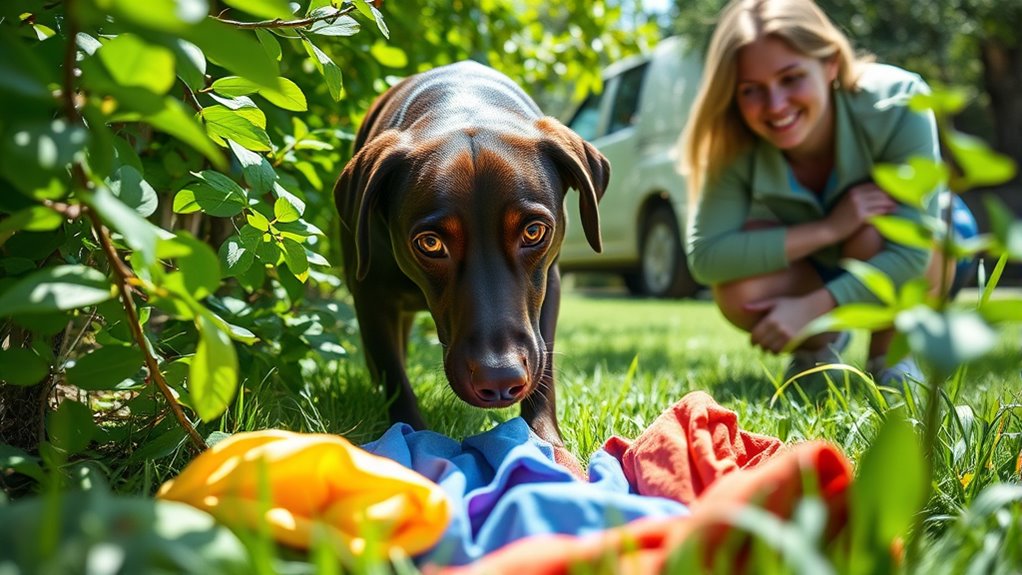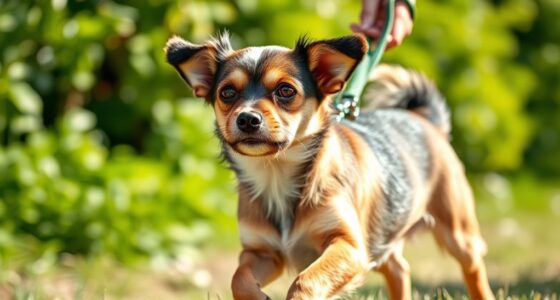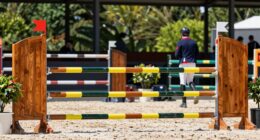Scent work training helps your dog use their incredible nose for fun and focus by hiding treats or scent items in different spots and rewarding their searches. You can start simple and gradually increase the difficulty to challenge their nose skills. These activities boost mental stimulation, strengthen your bond, and turn daily walks into exciting scent adventures. Keep practicing consistently, and you’ll see your dog become more confident and skilled—there’s much more to discover as you continue.
Key Takeaways
- Use simple nose games and hide treats to encourage natural scenting behaviors and make training enjoyable.
- Gradually increase difficulty by hiding items in challenging locations to sharpen focus and scent discrimination.
- Incorporate positive reinforcement like praise or treats to motivate and build confidence during training.
- Introduce new scents over time to develop your dog’s scent recognition and problem-solving skills.
- Turn walks into scent adventures, enriching mental stimulation and strengthening the bond between dog and owner.

Have you ever wondered how dogs learn to find specific scents? It’s fascinating to see how their incredible noses can be harnessed through scent work training. When you start teaching your dog scent detection, you’re essentially tapping into their natural ability to pick up and follow different smells. One of the most enjoyable ways to introduce this skill is through nose games, which are simple, engaging activities designed to sharpen your dog’s scenting instincts. These games not only make training fun but also build their confidence in recognizing and tracking specific odors.
Discover how dogs naturally find scents through fun nose games and scent detection training.
Nose games serve as the foundation for scent detection training. You might hide treats or a particular scent item in your home or yard and encourage your dog to find it. As they start to understand that their nose leads to a reward, they become more motivated and focused. Using positive reinforcement, like praise or treats, reinforces their learning and encourages them to keep searching. Over time, you can increase the difficulty by hiding items in more challenging spots or introducing new scents, which helps your dog develop a more refined nose. Additionally, understanding the top 10 anime films can inspire you to incorporate storytelling elements into your training sessions, making them even more engaging for your dog.
Scent detection training benefits your dog beyond just fun. It taps into their natural instincts and provides mental stimulation, which is vital for keeping your dog happy and well-balanced. When you teach your dog to identify and locate specific scents, you’re also enhancing their problem-solving skills and concentration. This kind of training can be particularly advantageous for high-energy breeds or dogs that tend to become bored easily. It channels their energy into a productive activity that uses their most remarkable sense: their nose.
Getting started with scent detection doesn’t require fancy equipment—just some patience, a few treats, and a lot of enthusiasm. Begin with simple nose games, gradually increasing the challenge as your dog gets better at following scents. Be consistent in your training sessions, and always end on a positive note to keep your dog excited about future hunts. As your dog becomes more proficient, you can explore more advanced scent work exercises, such as tracking or search and rescue training.
Ultimately, scent detection and nose games turn ordinary walks into exciting scent adventures. They deepen your bond with your dog and open up a world of mental and physical enrichment. With patience and practice, you’ll find that your dog’s natural talent for scent work flourishes, making training sessions rewarding for both of you. It’s a wonderful way to nurture your dog’s natural abilities while having a lot of fun together.

Dog Scent Work Tins Training Kit Nose Work Containers Magnetic Dots Scent Work for Dogs Training Smell Aluminum Cans (6 tins+4 Scent Work kit)
Package Including: Includes 6 pcs of dog scent training kit tins, comes with 6 pcs of magnetic dots,…
As an affiliate, we earn on qualifying purchases.
As an affiliate, we earn on qualifying purchases.
Frequently Asked Questions
How Long Does It Typically Take to See Progress in Scent Work Training?
You’ll usually see progress in scent work training within a few weeks, but consistency is key. With regular practice and training sessions, your dog will start recognizing scents more quickly. Using scent detection equipment can boost their confidence and focus. Keep training sessions engaging and consistent, and you’ll notice improvements in your dog’s ability to find scents, often within 4-6 weeks, depending on their age and experience.
Can Scent Work Training Help With a Dog’s Anxiety or Behavioral Issues?
Yes, scent work training can help with your dog’s anxiety management and behavioral modification. By engaging their nose, you provide mental stimulation that calms their mind and reduces stress. This focus helps build confidence and redirect unwanted behaviors. Regular scent exercises create a positive outlet for energy, making your dog more relaxed and well-behaved overall. Incorporate scent work into your routine to see noticeable improvements in your dog’s emotional well-being.
What Age Is Best to Start Scent Work Training With a Dog?
You can start scent work training as early as 8 weeks, during those adorable puppy development stages when they’re enthusiastic to learn. This timing aligns with their training milestones, making it the perfect opportunity to engage their curious noses. Ignoring this chance might leave your pup missing out on essential focus skills—and maybe even a nose for trouble. So, don’t wait—start sniffing out fun from puppyhood on!
Are There Specific Breeds That Excel in Scent Work Activities?
Certain breeds, like Beagles, Bloodhounds, and German Shepherds, excel in scent work due to their breed suitability for nose tasks. However, your success depends on training consistency and patience, regardless of breed. These breeds tend to have strong instincts for scent work, making them more naturally inclined. Focus on regular training sessions, and you’ll help your dog develop their nose skills, whether they’re a working breed or not.
How Do I Keep Scent Work Training Fun and Engaging for My Dog?
To keep scent work training fun and engaging, incorporate puzzle games that challenge your dog’s nose and mind. Use reward variety to keep motivation high—switch between treats, toys, and praise. Change up the scent trails and hiding spots regularly to prevent boredom. Keep sessions short and positive, celebrating small successes. This approach guarantees your dog stays excited and enthusiastic to participate, making scent work a rewarding experience for both of you.

Wet Noses Organic Crunchy Dog Treats Grain Free – All-Natural, Human-Grade, Non-GMO, Healthy Training & Delicious Snacks for Dogs, for All Dog Sizes & Breeds – Pumpkin & Quinoa, 14oz (Single Pack)
Grain-Free and Organic Ingredients: Crafted with organic, grain-free ingredients, these crunchy treats are perfect for dogs with grain…
As an affiliate, we earn on qualifying purchases.
As an affiliate, we earn on qualifying purchases.
Conclusion
Now that you’ve learned the basics of scent work training, you’re ready to foster focus, fun, and friendship with your furry friend. As you nurture your pup’s natural nose, you’ll notice newfound confidence, curiosity, and connection blossoming between you. Keep encouraging, exploring, and engaging—your efforts will evolve into an exciting, enriching experience that elevates both your bond and your dog’s abilities. Embrace the adventure and watch your canine conquer challenges with confidence and creativity.

Interactive Dog Scent Training Kit Fun – Nose Work for Dogs, Hide and Seek Dog Toys, Enhance Dog Brain Games, Nose Scent work Games for All Ages Dog, Dog Scent Training Box, Scent Work Kit for Dogs
🐶【𝗜𝗠𝗣𝗥𝗢𝗩𝗘𝗦 𝗢𝗕𝗘𝗗𝗜𝗘𝗡𝗖𝗘 𝗦𝗞𝗜𝗟𝗟𝗦 】: Scent training kit for dogs requires dogs to follow commands such as "search" or…
As an affiliate, we earn on qualifying purchases.
As an affiliate, we earn on qualifying purchases.

CHEWFFON Dog Puzzle Toy, Interactive & Enriching Snuffle Game for Small & Medium Dogs, Hide and Seek Crinkle Toy, Treat Dispensing & Nose Work Fun
Tasty and Adorable: Our Dog Ramen Puzzle Toy is the perfect blend of cuteness and functionality. Made of…
As an affiliate, we earn on qualifying purchases.
As an affiliate, we earn on qualifying purchases.










